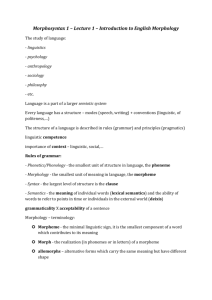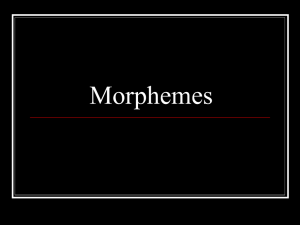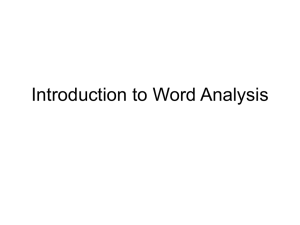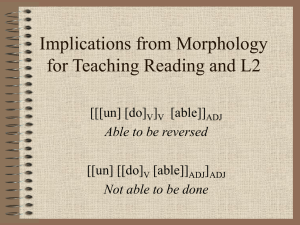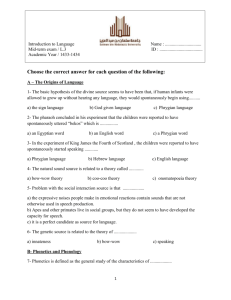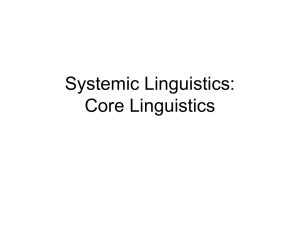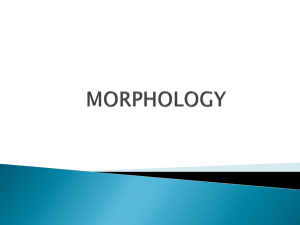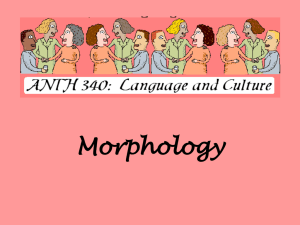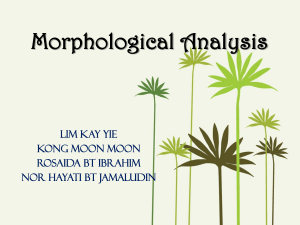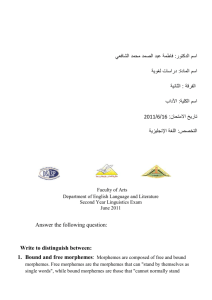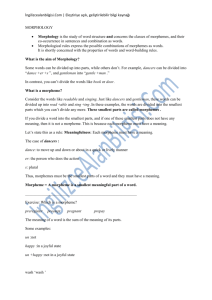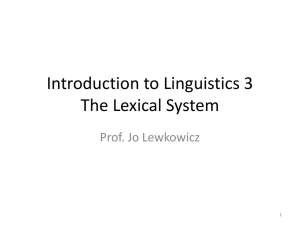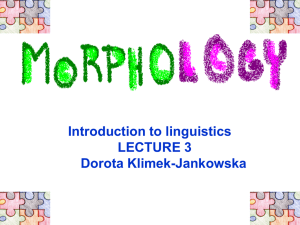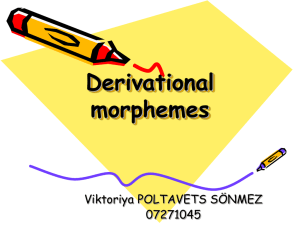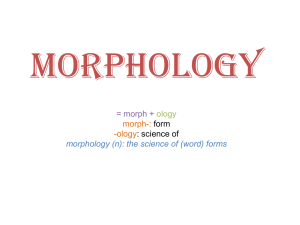Morphology
advertisement
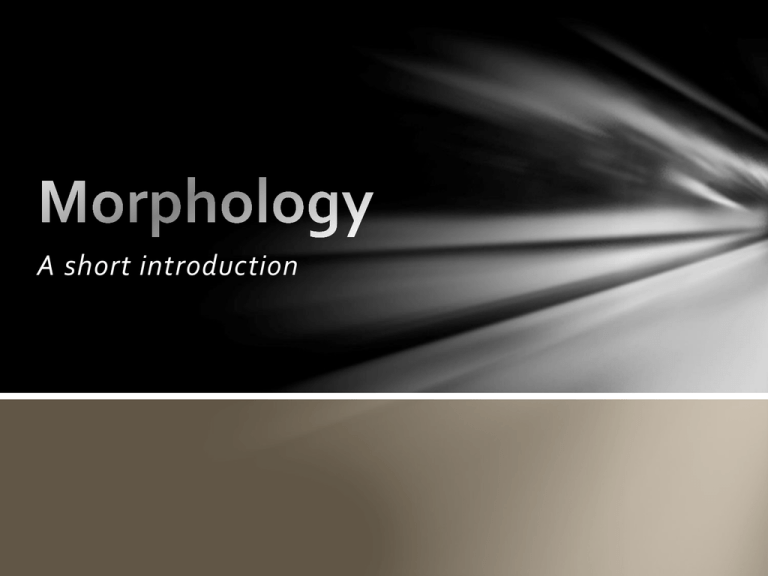
A short introduction Llanfairpwllgwyngyllgogerychwwyhndrobwllllantysiligogogoch (a town name in Wales) Morphology: Background and Basic Terms How is it that we can use and understand words in our language that we have never encountered before? Morphology: Background and Basic Terms (2) Morphology : the component of a grammar that deals with the internal structure of words. Morphology: Background and Basic Terms (3) Adjectives are abstract; they are not real forms. The real forms that represents them (in,-s, and –ful) are therefore usually called morphs. (Hocket,1947) Words Morphs Morphemes watched watch-ed WATCH+PAST pens pen-s PEN+PLURAL unhelpful un-help-ful NEGATIVE+HELP+ ADJECTIVE Definition • Type of investigation which analyzes all those basic “elements” which are used in language elements= linguistic message (morphemes). (Yule:1985) • The study of forms of words (Matthews:1979) • While syntax is concerned with how words arrange themselves into constructions, morphology is concerned with the forms of words themselves. (Malmkjaer:1991) The Minimal Meaningful Units of Language (Words Versus Morphemes) A word need not have any special phonetic properties: some words bear stress but others do not, some words set off by intonational signals but others are not. a door - adore Tone languages: a language is said to have tone when differences in word meaning are signaled by differences in pitch H [ma] L ‘mother’ High tone ‘hemp’ Low rise ‘horse’ Fall rise ‘scold’ High fall H [ma] ML H [ma] H L [ma] A word is a minimal free form (a) The hunters pursued the bear. (b) The bear was pursued by the hunters. • Words, though they may be definable as minimal free forms, are not minimal meaningful units of language. • The word hunters can stand alone (a free form), nonetheless consists of three meaningful parts : hunt, er, and s. (Morphemes). • The minimal meaningful units of language ARE NOT words, but arbitrary signs or MORPHEMES. Morpheme • A minimal unit of meaning or grammatical function (Yule:1985) • The smallest linguistic unit that has meaning (Johnson & Johnson:1999) • The elementary particle of lexicogrammar, the thing out of which words are built (Halliday:2004). • The smallest meaningful unit in a language. A morpheme cannot be divided without altering or destroying its meaning. For example, the English word kind is a morpheme. If the d is removed, it changes to kin, which has a different meaning. (Richard & Schmidt:2002) One Morpheme Two Three More than three and boy boy-s hunt hunt-er hunt-er-s hospital hospitalize hospital-ization gentle gentleman gentle-man- gentlely man-li-ness Hospital-ization-s Morphological Description: Elements of Morphology (Yule) lexical free functional Morphemes derivational bound inflectional Yule:1985 Free and Bound Morphemes • Free: A form which can be used on its own : Betty, horse, red, write, love, drive • Bound: a linguistic form (a MORPHEME) which is never used alone but must be used with another morpheme, e.g. as an AFFIX or COMBINING FORM. For example, the English suffix -ing must be used with a verb stem: writing, loving, driving. (Richard & Schmidt:2002) Bound Morphemes : Derivational Morphemes • used to make new words in the language and different grammatical category from the stem. The derivational morphemes -ness changes the adjective good to the noun goodness. [[good](Adj) ness] N Bound Morphemes : Inflectional Morphemes • are not used to make new words in the language , but rather to indicate aspects of the grammatical function of a word • Plural/Singular, tense, comparative/possessive form • English : All inflectional morphemes are suffixes. Bound Morphemes Bound Derivational Suffix and prefix New words Inflectional Suffix Plural/Singular, tense, comparative/possessive form Free Morphemes Free lexical Ordinary nouns, adjectives, verbs functional Conjunctions, prepositions, articles, pronouns. The elements of morphology: The boy’s wildness shocked the teachers. The (functional) shock (Lexical) boy -’s (lexical) (inflectional) -ed (inflecti onal) the (functional) wild (Lexical) teach (Lexical) -ness (derivational) -er -s (derivational) (inflectio nal) Morphological Description: Elements of Morphology (Bauer) inflection Morphology derivation wordformation composition/ compounding Bauer:1983 Word-formation: Composition/ Compounding • Two or more words combine into a morphological unit (Marchand:1969) • The combination of two free forms or words that have an otherwise independent existence. (Adams:1979) N+N football V+N N+V pickpocket, nosebleed, killjoy moonshine Adjective + N Particle + N software, slowcoach in-crowd, aftertaste V + Particle Phrase compounds clawback, gin-anddropout tonic, forget-menot Word-formation: Other word-formation types • Backformation: occurs when suffix is removed from a complex word (liaison – to liaise) • Blend: where normally initial and terminal segments of two words are joined together to create a new word: brunch (breakfast +lunch), chunnel (channel+tunnel), fantabulous (fantastic+fabulous). • Acronyms : words formed from the initial letters of a fixed phrase or title : SALT (strategic arms limitation talks), misty (more ideologically sound than you). Allomorph • Any of the different forms of a MORPHEME • For example, in English the plural morpheme is often shown in writing by adding -s to the end of a word, e.g. cat /kæt/ – cats /kæts/. Sometimes this plural morpheme is pronounced /z/, e.g. dog /dig/ – dogs /digz/, and sometimes it is pronounced /Iz/, e.g. class /kleNs/ – classes /`kleNsız/. /s/, /z/, and /Iz/ all have the same grammatical function in these examples, they all show plural; they are all allomorphs of the plural morpheme. Word Structure The structure of the entire word may be represented by means of either a set of labeled brackets or a tree diagram. [[[hospital] N ize] V ed]V V Af V N hospital Af iz ed Discussion 1. Draw the appropriate tree structure for each of these words: a) unhappiness b) denationalization c) fearlessly d) pre-viewer 2. What are the functional morphemes in the following sentences: The old man sat on a chair and told them tales of the woe 3. What are the inflectional morphemes in the following phrases: a) the teacher’s books b) the newest model
